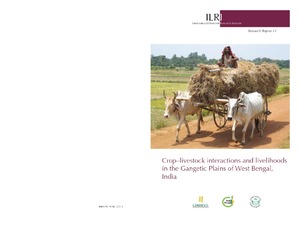Resource information
The research and development community faces the challenge of sustaining crop productivity gains, improving rural livelihoods and securing environmental sustainability in the Indo-Gangetic Plains (IGP). This calls for a better understanding of farming systems and of rural livelihoods, particularly with the advent of, and strong advocacy for, conservation farming and resource-conserving technologies. This scoping study presents an assessment of crop-livestock interactions and rural livelihoods in the Gangetic Plains of West Bengal, drawing from a village survey in three districts (Malda, Nadia and W Medinipur) and secondary data. The study reports are structured as follows. The second chapter presents the overall methodology followed and details about the specific survey locations. The third chapter presents the study area drawing primarily from secondary data and available literature. The fourth chapter analyses the livelihood platforms in the surveyed communities, distinguishing between the livelihood assets, access modifiers and trends and shocks. The fifth chapter describes the livelihood strategies in the surveyed communities, with particular attention for crop and livestock production. The sixth chapter assesses the crop-livestock interactions in the surveyed communities, with particular emphasis on crop residue management and livestock feeding practices. The seventh chapter first discusses the effects on livelihood security and environmental sustainability and subsequently dwells on the outlook for the surveyed communities and draws together an agenda for action.



